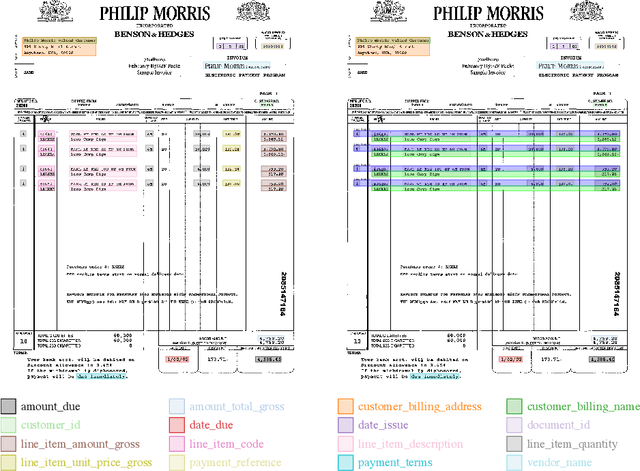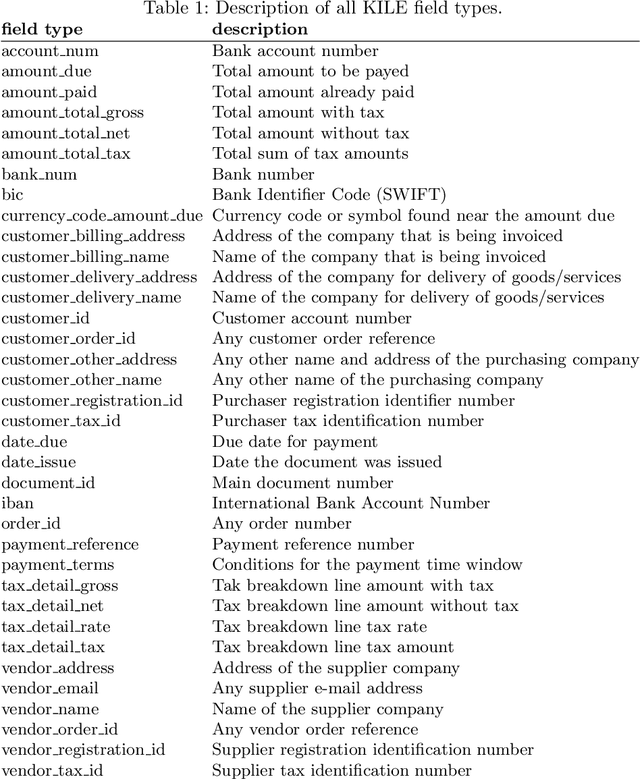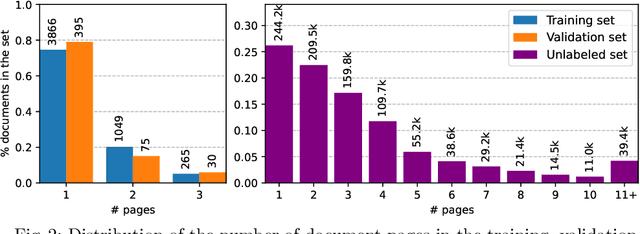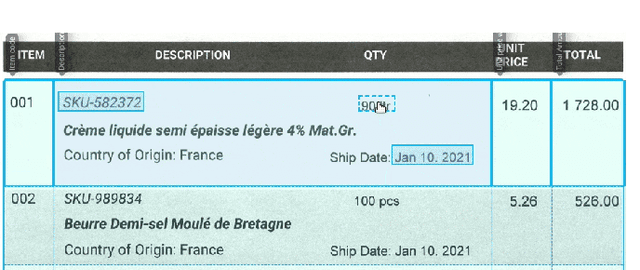Štěpán Šimsa
DocILE Benchmark for Document Information Localization and Extraction
Feb 11, 2023



Abstract:This paper introduces the DocILE benchmark with the largest dataset of business documents for the tasks of Key Information Localization and Extraction and Line Item Recognition. It contains 6.7k annotated business documents, 100k synthetically generated documents, and nearly~1M unlabeled documents for unsupervised pre-training. The dataset has been built with knowledge of domain- and task-specific aspects, resulting in the following key features: (i) annotations in 55 classes, which surpasses the granularity of previously published key information extraction datasets by a large margin; (ii) Line Item Recognition represents a highly practical information extraction task, where key information has to be assigned to items in a table; (iii) documents come from numerous layouts and the test set includes zero- and few-shot cases as well as layouts commonly seen in the training set. The benchmark comes with several baselines, including RoBERTa, LayoutLMv3 and DETR-based Table Transformer. These baseline models were applied to both tasks of the DocILE benchmark, with results shared in this paper, offering a quick starting point for future work. The dataset and baselines are available at https://github.com/rossumai/docile.
DocILE 2023 Teaser: Document Information Localization and Extraction
Jan 29, 2023Abstract:The lack of data for information extraction (IE) from semi-structured business documents is a real problem for the IE community. Publications relying on large-scale datasets use only proprietary, unpublished data due to the sensitive nature of such documents. Publicly available datasets are mostly small and domain-specific. The absence of a large-scale public dataset or benchmark hinders the reproducibility and cross-evaluation of published methods. The DocILE 2023 competition, hosted as a lab at the CLEF 2023 conference and as an ICDAR 2023 competition, will run the first major benchmark for the tasks of Key Information Localization and Extraction (KILE) and Line Item Recognition (LIR) from business documents. With thousands of annotated real documents from open sources, a hundred thousand of generated synthetic documents, and nearly a million unlabeled documents, the DocILE lab comes with the largest publicly available dataset for KILE and LIR. We are looking forward to contributions from the Computer Vision, Natural Language Processing, Information Retrieval, and other communities. The data, baselines, code and up-to-date information about the lab and competition are available at https://docile.rossum.ai/.
Business Document Information Extraction: Towards Practical Benchmarks
Jun 20, 2022

Abstract:Information extraction from semi-structured documents is crucial for frictionless business-to-business (B2B) communication. While machine learning problems related to Document Information Extraction (IE) have been studied for decades, many common problem definitions and benchmarks do not reflect domain-specific aspects and practical needs for automating B2B document communication. We review the landscape of Document IE problems, datasets and benchmarks. We highlight the practical aspects missing in the common definitions and define the Key Information Localization and Extraction (KILE) and Line Item Recognition (LIR) problems. There is a lack of relevant datasets and benchmarks for Document IE on semi-structured business documents as their content is typically legally protected or sensitive. We discuss potential sources of available documents including synthetic data.
 Add to Chrome
Add to Chrome Add to Firefox
Add to Firefox Add to Edge
Add to Edge